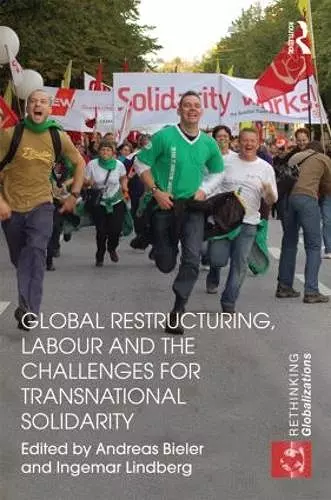Global Restructuring, Labour and the Challenges for Transnational Solidarity
Andreas Bieler editor Ingemar Lindberg editor
Format:Hardback
Publisher:Taylor & Francis Ltd
Published:15th Sep '10
Currently unavailable, and unfortunately no date known when it will be back
This hardback is available in another edition too:
- Paperback£45.99(9780415502375)

Globalisation has put national labour movements under severe pressure, due to the increasing transnationalisation of production, with the production of many goods being organised across borders, and the informalisation of the economy.
Through a range of case studies, this volume examines the possibilities and obstacles to transnational solidarity of labour in a period of global restructuring and changing global political economy. It brings together a range of international and transnational case studies, examining successful and failed transnational solidarity covering inter-trade union co-operation as well as co-operation between trade unions and social movements within the formal and informal economy, and the public and private sector. It is structured in six parts and examines:
- Globalisation and the new challenges for transnational solidarity
- Inter trade union co-operation across borders.
- The dynamics of co-operation between trade unions and social movements across borders, looking at developing and developed countries.
- The struggles to defend the public sector against private service providers.
- The possible ways forward towards transnational solidarity of formal and informal labour in the global economy.
This book will be of interest to students and scholars of International Political Economy, International Relations, Industrial Relation, Globalisation, Geography and History.
‘Rich in contextual evidence, this book explains how globalizing processes elicit different responses from workers and beget varied outcomes. Bieler and Lindberg deftly weave together several case studies, showing obstacles and strategic possibilities for trade unions. Their analysis is a breakthrough in coming to grips with the nexus of globalization and social movements.’ - James H. Mittelman, University Professor of International Affairs, American University
‘Liberation from the neo-liberal straight-jacket of uncontrolled global
economic power is impossible without the collective strength of working people.
However labour has to change in order to achieve change. Trade unions need to
reach beyond national boundaries, "standard" workers, and traditional labour
issues to create the global, inclusive and innovative solidarity movement
indispensable for change. This carefully edited book provides an excellent
analysis of the formidable challenges a progressive labour agenda is facing.
Solidarity does not emerge automatically, however, the collection of case
studies provides encouragement that these challenges are not insurmountable as
new broad coalitions emerge, new issues are taken up and cross boarder
solidarity is practised. A must read for those who are concerned about global
social justice and democratic self-determination.’ - Frank Hoffer, ILO Bureau for Workers' Activities
‘Bieler and Lindberg have brought together a great group of scholars and activists to address some of the most intractable issues in our current complex global modernity. Prominent among these are what it means to organize in today’s global economy and what are the new bases for solidarity when the space for politics cuts across the world. The many different perspectives in this book move us towards drawing this different type of map.’ - Saskia Sassen, Professor, Columbia University and author of Territory, Authority, Rights
ISBN: 9780415580830
Dimensions: unknown
Weight: 680g
280 pages